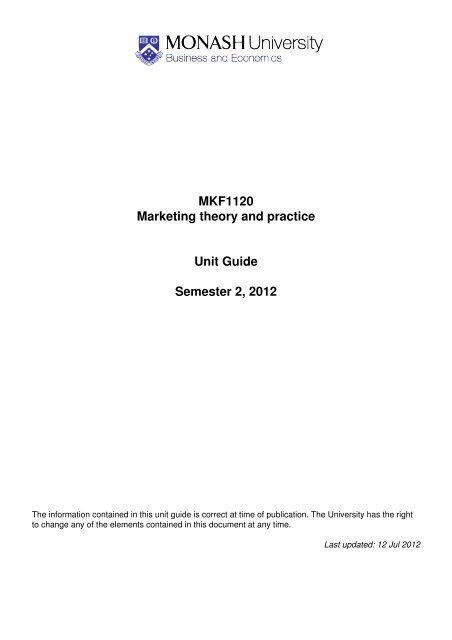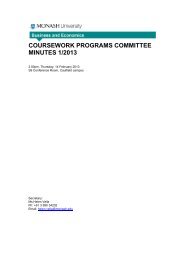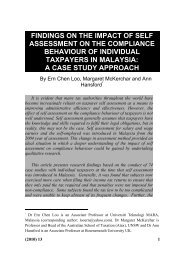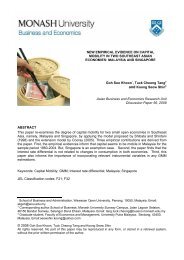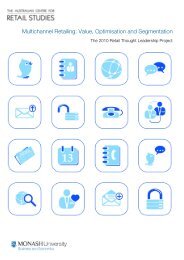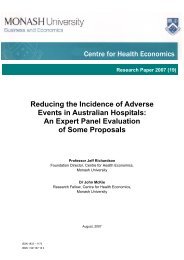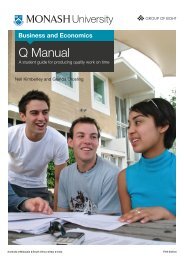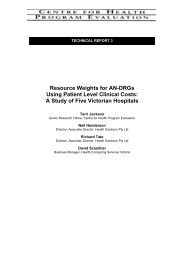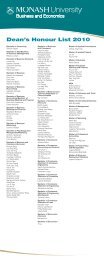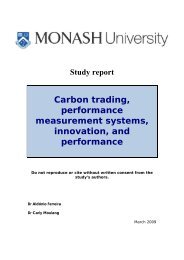MKF1120 Marketing theory and practice Unit Guide Semester 2, 2012
MKF1120 Marketing theory and practice Unit Guide Semester 2, 2012
MKF1120 Marketing theory and practice Unit Guide Semester 2, 2012
Create successful ePaper yourself
Turn your PDF publications into a flip-book with our unique Google optimized e-Paper software.
<strong>MKF1120</strong><br />
<strong>Marketing</strong> <strong>theory</strong> <strong>and</strong> <strong>practice</strong><br />
<strong>Unit</strong> <strong>Guide</strong><br />
<strong>Semester</strong> 2, <strong>2012</strong><br />
The information contained in this unit guide is correct at time of publication. The University has the right<br />
to change any of the elements contained in this document at any time.<br />
Last updated: 12 Jul <strong>2012</strong>
Table of Contents<br />
<strong>MKF1120</strong> <strong>Marketing</strong> <strong>theory</strong> <strong>and</strong> <strong>practice</strong> - <strong>Semester</strong> 2, <strong>2012</strong>................................................................1<br />
Mode of Delivery..............................................................................................................................1<br />
Workload..........................................................................................................................................1<br />
<strong>Unit</strong> Relationships............................................................................................................................1<br />
Prohibitions..........................................................................................................................1<br />
Chief Examiner............................................................................................................................................1<br />
Campus Lecturer.........................................................................................................................................1<br />
Berwick............................................................................................................................................1<br />
Caulfield...........................................................................................................................................1<br />
Tutors..........................................................................................................................................................2<br />
Berwick............................................................................................................................................2<br />
Caulfield...........................................................................................................................................2<br />
Academic Overview...................................................................................................................................3<br />
Learning Objectives.........................................................................................................................3<br />
Graduate Attributes..........................................................................................................................3<br />
Assessment Summary.....................................................................................................................3<br />
Hurdle Requirements...........................................................................................................3<br />
Second marking...................................................................................................................3<br />
Return of final marks............................................................................................................4<br />
Assessment criteria..............................................................................................................4<br />
Teaching Approach.....................................................................................................................................4<br />
Feedback.....................................................................................................................................................5<br />
Our feedback to You........................................................................................................................5<br />
Your feedback to Us........................................................................................................................5<br />
Previous Student Evaluations of this unit....................................................................................................5<br />
<strong>Unit</strong> Schedule.............................................................................................................................................6<br />
Assessment Requirements......................................................................................................................7<br />
Assessment Tasks...........................................................................................................................7<br />
Assessment task 1...............................................................................................................7<br />
Assessment task 2...............................................................................................................7<br />
Assessment task 3...............................................................................................................8<br />
Examinations...............................................................................................................................................8<br />
Examination 1..................................................................................................................................9<br />
Assignment submission...............................................................................................................................9<br />
Online submission...........................................................................................................................9<br />
Extensions <strong>and</strong> penalties.............................................................................................................................9<br />
Referencing requirements...........................................................................................................................9<br />
Other Information....................................................................................................................................11<br />
Policies..........................................................................................................................................11<br />
Student services............................................................................................................................11<br />
Moodle 2........................................................................................................................................11<br />
Prescribed text(s) <strong>and</strong> readings.........................................................................................12<br />
Recommended text(s) <strong>and</strong> readings..................................................................................12
<strong>MKF1120</strong> <strong>Marketing</strong> <strong>theory</strong> <strong>and</strong> <strong>practice</strong> - <strong>Semester</strong> 2, <strong>2012</strong><br />
Introduction to marketing activities undertaken by a wide range of organisations (business, government,<br />
profit, non profit); examines marketing <strong>theory</strong>, the marketing concept <strong>and</strong> its evolution from a strategic<br />
<strong>and</strong> applied perspective. The development of corporate <strong>and</strong> marketing strategic plans; analysis of an<br />
organisation <strong>and</strong> marketing's role, value-exchange processes, buyer behaviour, marketing research <strong>and</strong><br />
market analysis, the marketing environment, the use of marketing decision making tools; product<br />
concepts, strategies <strong>and</strong> development; distribution, pricing <strong>and</strong> communication mix strategies; services<br />
marketing; marketing management, implementation <strong>and</strong> control processes <strong>and</strong> procedures.<br />
Mode of Delivery<br />
•<br />
•<br />
Berwick (Day)<br />
Caulfield (Day)<br />
Workload<br />
The total time commitment required for this unit is 144 hours. In addition to the 36 hours of class contact<br />
students are expected to devote an additional 108 hours during the semester to studying for this unit.<br />
This includes time spent in the preparing for <strong>and</strong> completing assessment tasks, together with time spent<br />
in general study, revision, <strong>and</strong> exam preparation.<br />
<strong>Unit</strong> Relationships<br />
Prohibitions<br />
MKC1200, MKG1120, MKP1120, MKW1120<br />
Chief Examiner<br />
Mr Peter Wagstaff (semester 1)<br />
Dr Erica Brady (semester 2)<br />
Campus Lecturer<br />
Berwick<br />
Mrs Azra Bajric-Kolar<br />
Campus: Berwick<br />
Email: Azra.Bajric-Kolar@monash.edu<br />
Contact hours: TBA<br />
Caulfield<br />
Mr Peter Wagstaff<br />
Campus: Caulfield<br />
Phone: +61 3 990 32069<br />
Email: Peter.Wagstaff@monash.edu<br />
1
<strong>MKF1120</strong> <strong>Marketing</strong> <strong>theory</strong> <strong>and</strong> <strong>practice</strong> - <strong>Semester</strong> 2, <strong>2012</strong><br />
Dr Erica Brady<br />
Campus: Caulfield<br />
Phone: +61 3 990 32546<br />
Email: Erica.Brady@monash.edu<br />
Tutors<br />
Berwick<br />
TBA<br />
Caulfield<br />
TBA<br />
2
Academic Overview<br />
Learning Objectives<br />
The learning goals associated with this unit are to:<br />
1. describe the key concepts upon which the <strong>practice</strong> of marketing is based<br />
2. recognise these concepts in the marketplace <strong>and</strong> in everyday life<br />
3. discuss the role <strong>and</strong> influence of marketing in the organisational environment<br />
4. discuss how key marketing concepts can be used in analysing a range of marketing problems.<br />
Graduate Attributes<br />
Monash prepares its graduates to be:<br />
1. responsible <strong>and</strong> effective global citizens who:<br />
a. engage in an internationalised world<br />
b. exhibit cross-cultural competence<br />
c. demonstrate ethical values<br />
2. critical <strong>and</strong> creative scholars who:<br />
a. produce innovative solutions to problems<br />
b. apply research skills to a range of challenges<br />
c. communicate perceptively <strong>and</strong> effectively<br />
Assessment Summary<br />
Hurdle Requirements<br />
There is a hurdle requirement in this unit.<br />
The learning outcomes in this unit require students to demonstrate in the individual summative<br />
assessment task a comprehensive underst<strong>and</strong>ing of the topics covered in the unit. This is demonstrated<br />
by the requirement that the student must attain a mark of at least 50% in the final summative<br />
assessment task.<br />
A student’s final mark is normally the sum of the marks obtained in all of the individual assessment items<br />
in the unit. Where a student fails the unit solely because of failure to satisfy the hurdle requirement a<br />
mark of 48 will be returned for the unit.<br />
The individual summative assessment task is the final exam.<br />
Second marking<br />
Where an assessment task is given a fail grade by an examiner, that piece of work will be marked again<br />
by a second examiner who will independently evaluate the work, <strong>and</strong> consult with the first marker. No<br />
student will be awarded a fail grade for an assessment task or unit without a second examiner confirming<br />
the result.<br />
3
Academic Overview<br />
Note: Exceptions to this are individual pieces of assessment contributing 10% or less of the final mark,<br />
unless the total of such pieces exceeds 30% of the final mark.<br />
Return of final marks<br />
Faculty policy states that 'the final mark that a student receives for a unit will be determined by the Board<br />
of Examiners on the recommendation of the Chief Examiner taking into account all aspects of<br />
assessment'.<br />
The final mark for this unit will be released by the Board of Examiners on the date nominated in the<br />
Faculty Calendar. Student results will be accessible through the my.monash portal.<br />
Assessment criteria<br />
Assessment Criteria Grading Descriptors available at:<br />
http://www.buseco.monash.edu.au/esg/agu/policies/assessment.html.<br />
Assessment Task Value Due Date<br />
Weekly Tutorial Exercises 10% In tutorials, weeks 2, 4, 6, 7, 8, 9, 11<br />
Essay 20% To be submitted online (Moodle) by 9:00am, Friday 24 August<br />
<strong>2012</strong> (week 5).<br />
<strong>Semester</strong> test 20% Week 10, in tutorials<br />
Examination 1 50% To be advised<br />
Teaching Approach<br />
Lecture <strong>and</strong> tutorials or problem classes<br />
The unit is presented in 2 x 1-hour lectures <strong>and</strong> a 1-hour tutorial each week. There are 36 hours in total<br />
of class contact time during the semester. However, this time is not sufficient for you to succeed in the<br />
unit <strong>and</strong> you will need to invest an additional 9 hours per week, incrementally <strong>and</strong> consistently<br />
throughout the semester, in order to gain the opportunity for a reasonable grade.<br />
University is an environment whereby students must take responsibility for their own learning <strong>and</strong><br />
development of knowledge. The lectures are designed to provide you with an overview of the principles<br />
of marketing, but are not a summary of the textbook. They will provide you with examples of the<br />
marketing principles ‘in action’ <strong>and</strong> they will also provide support for assessment in terms of report<br />
writing, examination skills, etc. In the interests of developing your independent learning skills <strong>and</strong><br />
enhancing student participation, lecture outlines will be made available on the unit website. Lectures are<br />
designed to assist you to achieve the unit objectives listed above.<br />
The tutorial focus is on both skills development <strong>and</strong> knowledge development. They are designed to<br />
assist you with assessment <strong>and</strong> developing the skills listed using marketing knowledge. Please note that<br />
tutorials <strong>and</strong> lectures are of limited value if you do not prepare in advance. They are a learning resource<br />
for you, not a replacement of your own independent learning.<br />
It is important to underst<strong>and</strong> whilst there are core theoretical marketing principles <strong>and</strong> processes you<br />
must learn <strong>and</strong> underst<strong>and</strong>, that there are a few ‘absolutes’ in the marketing of an offer <strong>and</strong> the correct<br />
answers for marketing any offer may not be found in a textbook. This unit will attempt to help you build<br />
4
Academic Overview<br />
the cognitive, affective <strong>and</strong> attitudinal capabilities necessary to be a good marketer though employing<br />
discussion, reading <strong>and</strong> analysis, <strong>and</strong> preparation of assignments.<br />
Feedback<br />
Our feedback to You<br />
Types of feedback you can expect to receive in this unit are:<br />
•<br />
•<br />
•<br />
Informal feedback on progress in labs/tutes<br />
Graded assignments with comments<br />
Quiz results<br />
Your feedback to Us<br />
Monash is committed to excellence in education <strong>and</strong> regularly seeks feedback from students, employers<br />
<strong>and</strong> staff. One of the key formal ways students have to provide feedback is through SETU, Student<br />
Evaluation of Teacher <strong>and</strong> <strong>Unit</strong>. The University's student evaluation policy requires that every unit is<br />
evaluated each year. Students are strongly encouraged to complete the surveys. The feedback is<br />
anonymous <strong>and</strong> provides the Faculty with evidence of aspects that students are satisfied <strong>and</strong> areas for<br />
improvement.<br />
For more information on Monash's educational strategy, <strong>and</strong> on student evaluations, see:<br />
http://www.monash.edu.au/about/monash-directions/directions.html<br />
http://www.policy.monash.edu/policy-bank/academic/education/quality/student-evaluation-policy.html<br />
Previous Student Evaluations of this unit<br />
Student feedback has highlighted the following strengths in this unit: students are able to achieve the<br />
stated learning objectives, the unit is intellectually stimulating, learning resources support students' study<br />
in the unit, <strong>and</strong> feedback is timely <strong>and</strong> useful.<br />
Student feedback has also informed improvements to the unit, including: volume <strong>and</strong> timing of<br />
assessment tasks, choice of textbook <strong>and</strong> other learning resources, <strong>and</strong> activities conducted during<br />
tutorials<br />
If you wish to view how previous students rated this unit, please go to<br />
https://emuapps.monash.edu.au/unitevaluations/index.jsp<br />
5
<strong>Unit</strong> Schedule<br />
Week Activities Assessment<br />
0 O-week: Access Moodle No formal assessment or activities are<br />
undertaken in week 0<br />
1 Introduction to the unit, the value framework<br />
2 <strong>Marketing</strong> basics, history <strong>and</strong> philosophy of marketing;<br />
Essay advice<br />
3 The marketing environment<br />
Tutorial exercise<br />
4 <strong>Marketing</strong> information Tutorial exercise<br />
5 Buyer behaviour Submit essay (20%)<br />
6 Segmentation, targeting <strong>and</strong> positioning; the extended<br />
marketing mix<br />
Tutorial exercise<br />
7 <strong>Marketing</strong> mix: Product Tutorial exercise<br />
8 <strong>Marketing</strong> mix: Price Tutorial exercise<br />
9 <strong>Marketing</strong> mix: Distribution (place) Tutorial exercise<br />
10 <strong>Marketing</strong> mix: Integrated marketing communication<br />
(promotion)<br />
<strong>Semester</strong> test (20%)<br />
11 Current issues in marketing <strong>practice</strong> Tutorial exercise<br />
12 Strategy <strong>and</strong> planning, review <strong>and</strong> exam preparation<br />
SWOT VAC<br />
Examination period LINK to Assessment Policy:<br />
http://policy.monash.edu.au/policy-bank/<br />
academic/education/assessment/<br />
assessment-in-coursework-policy.html<br />
6
Assessment Requirements<br />
Assessment Tasks<br />
•<br />
•<br />
Assessment task 1<br />
Title:<br />
Weekly Tutorial Exercises<br />
Due date:<br />
In tutorials, weeks 2, 4, 6, 7, 8, 9, 11<br />
Details of task:<br />
Most weeks during semester there will be a “tutorial exercise” available for download from<br />
the unit website. You are to complete the exercises prior to the tutorial. Your answers are<br />
to be h<strong>and</strong>ed to your tutor who will assess them <strong>and</strong> return them to you in the following<br />
tutorial.<br />
Word limit:<br />
Maximum 1 piece of paper<br />
Weighting/Value:<br />
10%<br />
Estimated return date:<br />
Weekly tutorial answers will be returned to students during tutorials the week following<br />
submission.<br />
Criteria for marking:<br />
This is a series of seven individual assessment tasks, worth 10% of the marks in the unit.<br />
The grades returned to students will be based on your use of marketing <strong>theory</strong>, as well as<br />
your ability to apply that <strong>theory</strong> to <strong>practice</strong>.<br />
Learning objectives assessed:<br />
1, 2, 3 <strong>and</strong> 4<br />
Submission details:<br />
Tutorial exercises will only be accepted by your tutor, <strong>and</strong> only during your allocated<br />
tutorial time in the week that they are due. If you are absent from a tutorial without<br />
documented <strong>and</strong> appropriate evidence (e.g. medical certificate), then you will receive zero<br />
(0) marks for that week’s tutorial exercise. Late or email submission of tutorial exercise<br />
answers will not be accepted.<br />
Assessment task 2<br />
Title:<br />
Essay<br />
Due date:<br />
To be submitted online (Moodle) by 9:00am, Friday 24 August <strong>2012</strong> (week 5).<br />
Details of task:<br />
Using the business Flexicar (www.flexicar.com.au) as an example, you are to write an<br />
essay explaining:<br />
♦<br />
♦<br />
♦<br />
<strong>Marketing</strong> (as a business philosophy);<br />
Customer value; <strong>and</strong><br />
The link between customer value <strong>and</strong> marketing.<br />
The format must be an essay – refer to the Q-Manual for further guidelines on our<br />
expectations of an essay. You are welcome to use headings <strong>and</strong> tables within your essay<br />
if you wish. Your assignment should be fully <strong>and</strong> correctly referenced using the APA<br />
referencing style, <strong>and</strong> you should use at least five (5) sources of information - at least<br />
7
Assessment Requirements<br />
•<br />
two of these should be from academic journals.<br />
Word limit:<br />
1,500 words (10% tolerance) excluding cover <strong>and</strong> title pages <strong>and</strong> references.<br />
Weighting/Value:<br />
20%<br />
Estimated return date:<br />
Assessed essays will be returned to students by the end of week 7 of semester.<br />
Criteria for marking:<br />
This will be available on the unit website<br />
Learning objectives assessed:<br />
1, 2, 3 <strong>and</strong> 4<br />
Submission details:<br />
Submission instructions, further guidelines <strong>and</strong> marking criteria are available on the<br />
<strong>MKF1120</strong> website.<br />
Penalties for late lodgement:<br />
A penalty of 10 percent of the available marks for this essay will be deducted for each day<br />
(or part-thereof) that the assessment is late.<br />
Assessment coversheet:<br />
Work submitted for assessment must be accompanied by a completed copy of the Faculty<br />
Cover Sheet which has been signed by the student. NO assignment will be accepted or<br />
marked if it is not accompanied fully completed <strong>and</strong> signed Faculty Assignment Cover<br />
Sheet. If the assignment is submitted with an incomplete or unsigned Faculty Assignment<br />
Cover Sheet will be deemed as late <strong>and</strong> incur late penalties until the cover sheet is<br />
completed correctly.<br />
http://www.buseco.monash.edu.au/student/forms/index.html<br />
Assessment task 3<br />
Title:<br />
<strong>Semester</strong> test<br />
Due date:<br />
Week 10, in tutorials<br />
Details of task:<br />
During tutorials in week 10 of semester. The test will be held in a computer lab, details of<br />
location are available in Allocate+. You will have 45 minutes to complete this test.<br />
This is a closed-book multiple-choice test, to be completed online in a designated Monash<br />
computer lab during your scheduled tutorial time. Further details will be available on the<br />
unit website in week 9 of semester.<br />
Weighting/Value:<br />
20%<br />
Estimated return date:<br />
Results for the semester test will be given to students at the end of week 10 via the unit<br />
website.<br />
Learning objectives assessed:<br />
1, 2, 3, 4<br />
Examinations<br />
8
Assessment Requirements<br />
•<br />
Examination 1<br />
Weighting:<br />
50%<br />
Length:<br />
2 hours<br />
Type (open/closed book):<br />
Closed book<br />
Electronic devices allowed in the exam:<br />
None<br />
Assignment submission<br />
Online submission<br />
If Electronic Submission has been approved for your unit, please submit your work via the VLE site for<br />
this unit, which you can access via links in the my.monash portal.<br />
Extensions <strong>and</strong> penalties<br />
Submissions for an extension of time for the completion of assignments (including the mid semester<br />
assessment) must be presented in writing (they may be sent electronically) <strong>and</strong> approved by the <strong>Unit</strong><br />
Coordinator (extensions will not be granted by your tutor). Extensions will only be granted with current<br />
<strong>and</strong> legitimate proof – current medical certificate, counsellor’s certificate or other appropriate<br />
documented evidence. You should refer to the following website for detail information concerning special<br />
consideration.<br />
http://www.buseco.monash.edu.au/student/exams/specconsemester.php<br />
The <strong>Unit</strong> Coordinator reserves the right to deny an extension if proof of incapacitation is not sufficient.<br />
Students should back-up their work in multiple ways to ensure issues of disk corruption <strong>and</strong> loss of work<br />
are minimised. Extensions will not be granted for loss of work, disk corruption, or printer problems.<br />
Referencing requirements<br />
You will often be directed to cite the source of the ideas, statistics, direct quotations <strong>and</strong> general<br />
information that you use to prepare your written assignments.<br />
This is important for a number of reasons.<br />
Firstly, it is good professional <strong>and</strong> ethical conduct to always give due credit to those people whose work<br />
you have borrowed.<br />
Secondly, it is an element of good communication to ensure that your readers can exp<strong>and</strong> their<br />
underst<strong>and</strong>ing of your writing by accessing the same sources you have used to formulate your thoughts.<br />
Thirdly, all organisations, including your present or future employer, have written or understood rules of<br />
the behaviour that is valued in that organisation. These rules often include the ways that it communicates<br />
internally <strong>and</strong> externally. In the academic organisation the intellectual property of other researchers <strong>and</strong><br />
writers is highly valued. Citing their work is a way of acknowledging their contribution to scholarship.<br />
9
Assessment Requirements<br />
For guidelines on referencing <strong>and</strong> essay writing please refer to the faculty Q Manual. Copies of this<br />
Manual can be obtained on line at: http://www.buseco.monash.edu.au/publications/qmanual/<br />
10
Other Information<br />
Policies<br />
Monash has educational policies, procedures <strong>and</strong> guidelines, which are designed to ensure that staff <strong>and</strong><br />
students are aware of the University's academic st<strong>and</strong>ards, <strong>and</strong> to provide advice on how they might<br />
uphold them. You can find Monash's Education Policies at:<br />
http://policy.monash.edu.au/policy-bank/academic/education/index.html<br />
Key educational policies include:<br />
• Plagiarism<br />
(http://www.policy.monash.edu/policy-bank/academic/education/conduct/plagiarism-policy.html)<br />
• Assessment<br />
(http://www.policy.monash.edu/policy-bank/academic/education/assessment/assessment-in-coursework-po<br />
• Special Consideration<br />
(http://www.policy.monash.edu/policy-bank/academic/education/assessment/special-consideration-policy.h<br />
• Grading Scale<br />
(http://www.policy.monash.edu/policy-bank/academic/education/assessment/grading-scale-policy.html)<br />
• Discipline: Student Policy<br />
(http://www.policy.monash.edu/policy-bank/academic/education/conduct/student-discipline-policy.html)<br />
• Academic Calendar <strong>and</strong> <strong>Semester</strong>s (http://www.monash.edu.au/students/key-dates/);<br />
• Orientation <strong>and</strong> Transition (http://www.infotech.monash.edu.au/resources/student/orientation/);<br />
<strong>and</strong><br />
• Academic <strong>and</strong> Administrative Complaints <strong>and</strong> Grievances Policy<br />
(http://www.policy.monash.edu/policy-bank/academic/education/management/complaints-grievance-policy.<br />
Student services<br />
The University provides many different kinds of support services for you. Contact your tutor if you need<br />
advice <strong>and</strong> see the range of services available at www.monash.edu.au/students<br />
The Monash University Library provides a range of services <strong>and</strong> resources that enable you to save time<br />
<strong>and</strong> be more effective in your learning <strong>and</strong> research. Go to http://www.lib.monash.edu.au or the library<br />
tab in my.monash portal for more information.<br />
Students who have a disability or medical condition are welcome to contact the Disability Liaison <strong>Unit</strong> to<br />
discuss academic support services. Disability Liaison Officers (DLOs) visit all Victorian campuses on a<br />
regular basis<br />
• Website: http://adm.monash.edu/sss/equity-diversity/disability-liaison/index.html;<br />
• Telephone: 03 9905 5704 to book an appointment with a DLO;<br />
• Email: dlu@monash.edu<br />
• Drop In: Equity <strong>and</strong> Diversity Centre, Level 1 Gallery Building (Building 55), Monash University,<br />
Clayton Campus.<br />
Moodle 2<br />
All unit <strong>and</strong> lecture materials, plus other information of importance to students, are available through the<br />
virtual learning environment Moodle site. You can access Moodle via the my.monash portal.<br />
11
Other Information<br />
Where to go for help<br />
If you're stuck, confused or simply not sure how to approach Moodle, there are a number of Moodle<br />
resources that you can tap into.<br />
Prescribed text(s) <strong>and</strong> readings<br />
It is not necessary to purchase a textbook for this unit. A complete set of resources will be available<br />
through Moodle. Should you wish to use a textbook see the recommended text below.<br />
Recommended text(s) <strong>and</strong> readings<br />
Recommended text:<br />
Kotler, P., Brown, L., Burton, S., Deans, K. <strong>and</strong> Armstrong, G., (2010). <strong>Marketing</strong>, 8th ed. Pearson<br />
Education.<br />
The review <strong>and</strong> use of academic <strong>and</strong> practitioner journals is an important part of building knowledge <strong>and</strong><br />
insight into marketing <strong>theory</strong> <strong>and</strong> <strong>practice</strong>. We recommend that marketing students read the following;<br />
newspapers, magazines <strong>and</strong> online resources: The Age, The Financial Review, The Australian,<br />
Mumbrella, <strong>Marketing</strong>, B&T Weekly <strong>and</strong> BRW. These journals will also be very useful in the preparation<br />
of assignments in this <strong>and</strong> other business units.<br />
12


